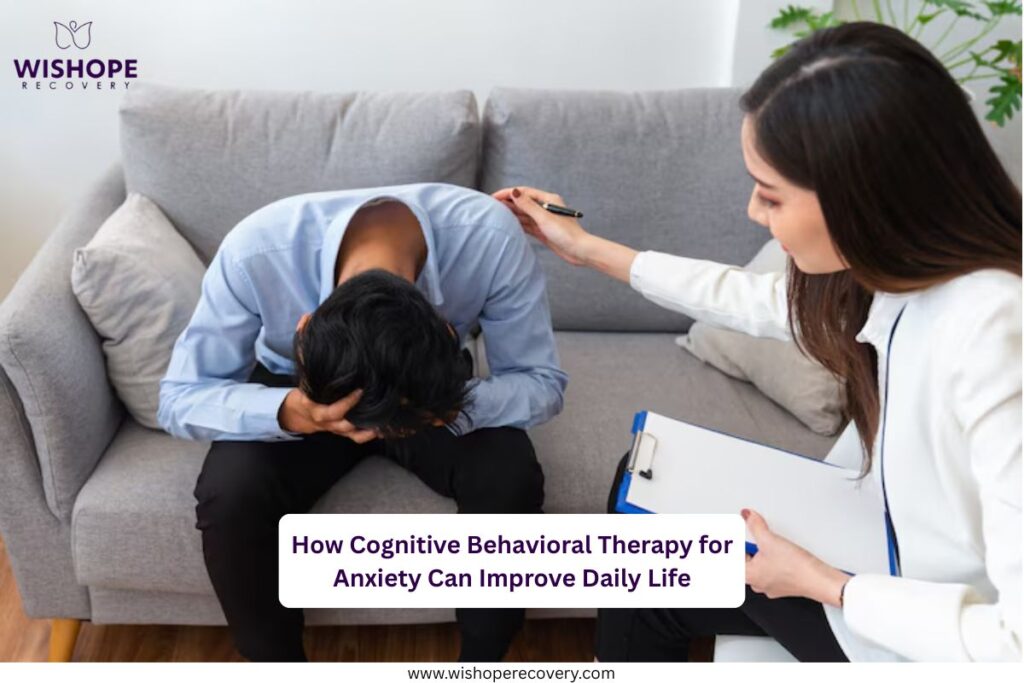Struggling with anxiety on a daily basis? You’re not alone—and there is a way to feel better. One of the most effective and proven methods to manage anxiety is cognitive behavioral therapy for anxiety—or CBT for short. It’s not about magically erasing your stress but learning how to understand it, challenge it, and take back control of your life.
Did you know? According to the Anxiety & Depression Association of America, anxiety disorders affect over 40 million adults in the U.S. every year. And yet, only a fraction of them receive proper treatment. That’s where CBT steps in.
Let’s break down how CBT therapy for anxiety can actually make your daily life better—and why it might be exactly what you’ve been looking for.
What Is Cognitive Behavioral Therapy (CBT)?
CBT, or cognitive behavioral therapy, is a type of talk therapy that focuses on how your thoughts, feelings, and behaviors are connected. It helps you recognize patterns that are unhelpful—like catastrophizing, negative self-talk, or avoidance—and teaches you how to change them in realistic, empowering ways.
Instead of just treating symptoms, CBT gives you tools to understand and manage your anxiety at its roots.
At WisHope Recovery Center, CBT is one of the core therapies offered to help people not just survive but thrive in recovery and daily life.
Everyday Benefits of CBT for Anxiety
So, how does CBT therapy for anxiety make a real difference in your daily routine? Let’s explore.
1. You Gain Control Over Your Thoughts
With anxiety, thoughts can spiral quickly. One small worry becomes a mountain of what-ifs. CBT teaches you how to catch these thoughts early, examine them, and replace them with more balanced thinking. This leads to less stress and more clarity in everyday decisions.
2. Improved Sleep and Rest
It’s no secret that anxiety keeps many of us up at night. Racing minds, physical restlessness, and nighttime dread are common. CBT techniques like relaxation training, breathing exercises, and cognitive restructuring can help you unwind and finally get quality rest.
3. You’re Better Equipped for Social Situations
Social anxiety isn’t just shyness—it can be overwhelming fear in everyday interactions. CBT breaks down these fears and builds up your confidence gradually. That means less worrying before a meeting or a hangout and more showing up as your authentic self.
4. You Stop Avoiding Important Things
Avoidance is a common coping mechanism for people with anxiety. Maybe you skip events, avoid tough conversations, or delay important tasks. CBT therapy for anxiety helps you build tolerance to discomfort and find ways to face challenges instead of running from them.
5. Improved Relationships
When anxiety takes over, it often affects how we connect with others. Irritability, withdrawing, or being overly dependent can strain relationships. Cognitive Behavioral Therapy for anxiety helps you understand these dynamics and develop healthier ways to communicate and connect.

What Makes CBT So Effective?
There’s a reason CBT therapy for anxiety is considered a gold standard in treatment. Study after study shows that it works—often just as effectively as medication, and in some cases, even better long-term.
Why? Because it teaches you how to be your own therapist. You learn how to recognize and shift your thought patterns so that anxiety doesn’t get to run the show anymore.
Plus, it’s structured and goal-oriented. You’re not just venting—you’re making real, measurable progress.
Real-Life CBT Techniques That Actually Work
What makes CBT so practical is that it’s full of real strategies you can use every day. You might learn:
- Thought journaling – to help track and challenge anxious thoughts
- Mindfulness and grounding – to stay present instead of spiraling
- Behavioral experiments – to test fears in safe, gradual steps
- Relaxation techniques – to calm your body and mind on demand
These aren’t just for therapy sessions—they go with you into your workday, your home life, and your social circles. And over time, you start seeing real, lasting changes.
Why It’s Effective for Adults
CBT is incredibly effective as behavioral therapy for adults because it’s practical, collaborative, and focused on now—not just the past. You and your therapist work as a team to set goals, practice new skills, and celebrate progress.
And unlike some forms of therapy that can feel open-ended or abstract, CBT is usually time-limited and goal-oriented. You’ll know what you’re working toward—and why.
Whether you’ve dealt with anxiety for years or it’s recently started affecting your life, CBT offers a structured and compassionate path forward.
Looking for Cognitive Behavioral Therapy Near You?
Finding the right help is key. If you’ve been searching for cognitive behavioral therapy near me, you’re not alone—and you’re not out of options.
At WisHope Recovery Center, we offer evidence-based cognitive behavioral therapy for anxiety as part of our comprehensive mental health and addiction treatment programs. We work closely with you to create a treatment plan that fits your unique needs, history, and goals.
Whether you’re navigating anxiety, co-occurring conditions like depression or substance use, or just want better tools for everyday stress—our team is here to help.
Ready to Take the First Step?
Anxiety doesn’t have to control your life. If you’ve been dealing with endless worry, low confidence, sleepless nights, or avoidance, know this: there’s hope, and there’s help. CBT therapy for anxiety is not just about managing—it’s about transforming how you experience life. You deserve to feel calm, capable, and connected again.
Reach out to WisHope Recovery Center today to learn more about our treatment options and how we can support your journey toward a brighter, less anxious future. Whether you’re just starting to explore therapy or ready to dive in, we’re here to walk alongside you.

